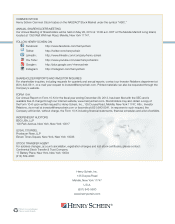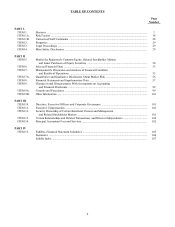Henry Schein 2013 Annual Report Download - page 19
Download and view the complete annual report
Please find page 19 of the 2013 Henry Schein annual report below. You can navigate through the pages in the report by either clicking on the pages listed below, or by using the keyword search tool below to find specific information within the annual report.10
Governmental Regulations
Operating, Security and Licensure Standards
Certain of our businesses involve the distribution of pharmaceuticals and medical devices, and in this regard we
are subject to various local, state, federal and foreign governmental laws and regulations applicable to the
distribution of pharmaceuticals and medical devices. Among the federal laws applicable to us are the Controlled
Substances Act, the Federal Food, Drug, and Cosmetic Act, as amended, and Section 361 of the Public Health
Service Act. We are also subject to comparable foreign regulations.
The Federal Food, Drug, and Cosmetic Act (“FDC Act”) generally regulates the introduction, manufacture,
advertising, labeling, packaging, storage, handling, reporting, marketing and distribution of, and record keeping for,
pharmaceuticals and medical devices shipped in interstate commerce, and states may similarly regulate such
activities within the state. Section 361 of the Public Health Service Act, which provides authority to prevent the
spread of communicable diseases, serves as the legal basis for the United States Food and Drug Administration’ s
(“FDA”) regulation of human cells, tissues, and cellular and tissue-based products, also known as HCT/P products.
The FDC Act also establishes certain requirements applicable to the wholesale distribution of prescription
drugs, including the requirement that wholesale drug distributors be licensed by each state in which they conduct
business, provide certain drug pedigree information on the distribution of prescription drugs and act in accordance
with federally established guidelines on storage, handling and record maintenance. The newly enacted Drug
Quality and Security Act of 2013, which was signed into law by President Obama on November 27, 2013, amends
the FDC Act with respect to pharmaceutical supply chain requirements and preempts state law. The Drug Quality
and Security Act provides that over the next 10 years the FDA will implement a national electronic, interoperable
system to identify and trace certain prescription drugs as they are distributed in the United States.
Under the Controlled Substances Act, as a distributor of controlled substances, we are required to obtain and
renew annually registrations for our facilities from the United States Drug Enforcement Administration permitting
us to handle controlled substances. We are also subject to other statutory and regulatory requirements relating to
the storage, sale, marketing, handling and distribution of such drugs, in accordance with the Controlled Substances
Act and its implementing regulations, and these requirements have been subject to heightened enforcement activity
in recent times. We are subject to inspection by the United States Drug Enforcement Administration.
Certain of our businesses are also required to register for permits and/or licenses with, and comply with
operating and security standards of, the United States Drug Enforcement Administration, the FDA, the United
States Department of Health and Human Services, and various state boards of pharmacy, state health departments
and/or comparable state agencies as well as comparable foreign agencies, and certain accrediting bodies depending
on the type of operations and location of product distribution, manufacturing or sale. These businesses include
those that distribute, manufacture and/or repackage prescription pharmaceuticals and/or medical devices and/or
HCT/P products, or own pharmacy operations, or install, maintain or repair equipment. In addition, Section 301 of
the National Organ Transplant Act, and a number of comparable state laws, impose civil and/or criminal penalties
for the transfer of certain human tissue (for example human bone products) for valuable consideration, while
generally permitting payments for the reasonable costs incurred in procuring, processing, storing and distributing
that tissue. The United States Drug Enforcement Administration, the FDA and state regulatory authorities have
broad inspection and enforcement powers, including the ability to suspend or limit the distribution of products by
our distribution centers, seize or order the recall of products and impose significant criminal, civil and
administrative sanctions for violations of these laws and regulations. Furthermore, compliance with legal
requirements has required and may in the future require us to institute voluntary recalls of products we sell, which
could result in financial losses and potential reputational harm. Our customers are also subject to significant
federal, state, local and foreign governmental regulation.
Certain of our businesses are subject to various additional federal, state, local and foreign laws and regulations,
including with respect to the sale, transportation, storage, handling and disposal of hazardous or potentially
hazardous substances, and safe working conditions. There have also been increasing efforts by various levels of
government to regulate the pharmaceutical distribution system in order to prevent the introduction of counterfeit,
adulterated or misbranded pharmaceuticals into the distribution system.
























